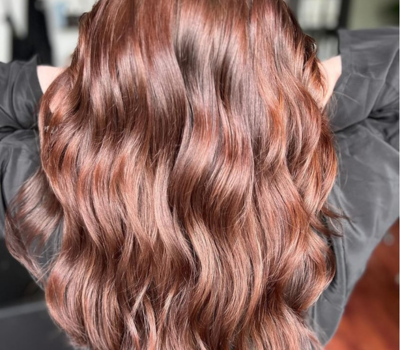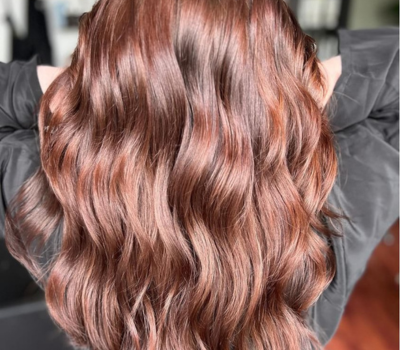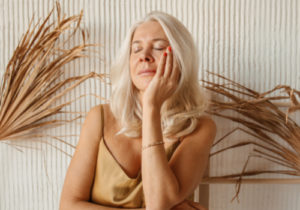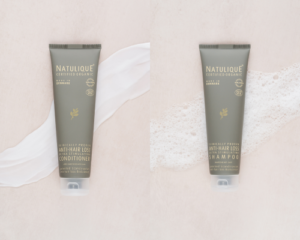"`html
When it comes to hair care, curly hair needs special attention, especially when it comes to moisturizing. Due to its unique structure, curly hair tends to be drier than other hair types. So it's essential to understand why moisturizing is crucial to maintaining its health and beauty.
The importance of hydration for curly hair
Unique curly hair structure
Intrinsic characteristics of curly hair
Curly hair has a particular structure that sets it apart from other hair types. In their natural state, curls form tight or loose spirals, making them more vulnerable to external aggression and moisture loss. The cuticle of curly hair is often more open, making it easier for water to evaporate and moisturizing products to be absorbed less effectively.
How structure impacts hydration
The spiral structure of curly hair limits the uniform dispersion of the natural oils produced by the scalp. This means that protective oils fail to nourish the entire hair fiber, resulting in increased dryness. The challenge, therefore, lies in providing constant, adequate hydration to compensate for this natural deficiency.
Water's vital role in hair health
The benefits of moisturizing on hair health
Moisture plays a crucial role in maintaining the health of curly hair. Proper hydration makes hair softer and more supple, and facilitates styling. It also helps prevent breakage and split ends, contributing to a healthier overall appearance. By incorporating water and moisturizing products into your hair routine, curly hair can regain its natural shine.
The impact of dehydration on curly hair
Dehydration can cause a variety of problems for curly hair. Without sufficient moisture, curls can become dull, frizzy and brittle. Cuticles open up more, promoting moisture loss and the appearance of dry hair. This lack of moisture also leads to uncontrollable frizz and makes curls difficult to manage.
“`
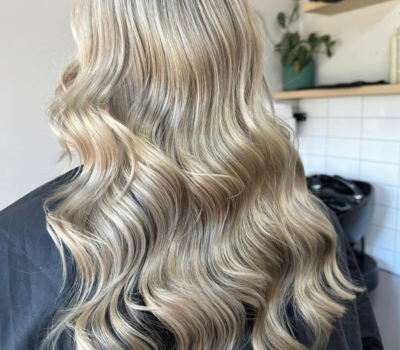
"`html
Problems caused by poorly moisturized curly hair
Signs of dry hair
Symptoms of inadequate hydration
When curly hair lacks moisture, several telltale signs appear. Among the most common symptoms are a rough, coarse texture to the touch. Curls can also lose definition, resulting in a blurred, disordered appearance. Another indicator is the increased presence of frizz, resulting from an unsealed cuticle and a lack of a protective barrier against humidity.
The consequences of prolonged dehydration
Long-term impact on hair health
Prolonged inadequate hydration can have serious repercussions on the health of curly hair. Over time, hair fibers become brittle, increasing the risk of breakage and split ends. This structural damage makes hair growth more difficult, and can even lead to a noticeable loss of volume. Curls can also lose their natural elasticity, appearing lifeless and damaged.
The aesthetic impact of capillary dehydration
In addition to its impact on hair health, poor hydration also affects the aesthetic appearance of curly hair. A lack of moisture leaves hair dull and lacking in natural shine. Curls lack bounce and spring, altering their overall look. What's more, the difficulty of styling dry hair increases, as strands tangle more easily, making the styling process more laborious and often painful.
Curly hair color can also be adversely affected by inadequate moisturizing. When hair is too dry, color can fade more easily, giving a washed-out, dull appearance. It is therefore essential to ensure optimal hydration not only to preserve the hair's structural integrity, but also to maintain its shine and vitality.
Ultimately, paying particular attention to hydrating curly hair is crucial to avoiding these problems. Incorporating effective methods and suitable products into your hair routine not only helps to alleviate the effects of dehydration, but also promotes healthy, shiny curls that are full of life.
“`
See also: Why avoid harsh shampoos?
"`html
The best ways to moisturize curly hair
Choosing the right moisturizing product
Focus on ingredients
Choosing the right product to moisturize curly hair starts with careful attention to ingredients. Opt for products containing natural moisturizing agents such as aloe vera, honey or shea butter, which help retain moisture in the hair fiber. Natural oils such as coconut oil, argan oil and jojoba oil are also valuable allies, sealing in moisture and providing a protective layer against external aggressors.
Avoid drying ingredients
At the same time, it's crucial to avoid products containing sulfates, silicones and alcohol, which can strip hair of its natural oils, causing increased dryness. Choose formulas that are paraben-free and free from harsh chemicals, to ensure gentle moisturizing that respects your scalp. Reading labels carefully is essential to protect your curls.
Application techniques for optimal hydration
Washing routine and conditioning care
A good practice for maintaining hydration is to adopt a proper washing routine. Use moisturizing shampoos and always follow with a conditioner rich in nourishing agents. Conditioner helps bring moisture back and soften curls, improving manageability and overall appearance. One option for maximizing hydration is to practice co-washing, which involves washing hair with conditioner alone, thus avoiding the drying effects of detergent agents present in traditional shampoos.
Deep moisturizing
Deep moisturizers play a key role in keeping curly hair hydrated. Incorporate hair masks rich in nourishing ingredients into your weekly or fortnightly routine. These masks should be applied from roots to ends, then left on for at least 15-30 minutes to ensure maximum nutrient absorption. You can even wrap your hair in a warm towel during the treatment to promote better penetration of the moisturizing active ingredients.
Using the LOC method
The LOC (Liquid, Oil, Cream) method is a popular and effective way to deeply moisturize curly hair. It involves first applying a liquid, usually water or a moisturizing mist, to open the hair cuticle. Next, an oil is applied to nourish and seal in the initial moisture. Finally, a moisturizing cream helps set the whole, ensuring that each curl retains its moisture and stays defined throughout the day.
Everyday habits
Protecting hair while you sleep
Adopting good sleeping habits helps keep curly hair moisturized. Using a silk or satin pillowcase reduces friction, minimizing breakage and moisture loss. You can also wrap your hair in a silk scarf to protect your curls from night-time movements that cause dehydration.
Daily moisturizing
Incorporating moisturizing sprays or lightweight hair milks into your daily routine helps restore moisture lost throughout the day. These lightweight products can be sprayed on or applied lightly as touch-ups, especially during dry weather or after exposure to sun and wind, which are known to dry out curly hair.
“`
Avoid bad habits to keep curly hair moisturized
Using high-temperature styling tools
Avoid excessive heat
Frequent use of high-temperature styling tools, such as straightening irons and hair dryers, can lead to significant moisture loss. Excessive heat causes cuticles to open up, allowing moisture to evaporate more easily. It is therefore advisable to limit the use of these tools and prefer heat-free styling methods wherever possible.
Essential thermal protection
When the use of heat is unavoidable, it's imperative to apply a thermal protector to curly hair. These products create a protective barrier that reduces heat damage by minimizing moisture loss. Be sure to set your appliances to the lowest possible temperature to preserve the health of your curls.
Washing your hair too frequently
The trap of frequent washing
Washing hair too often can rob curly hair of its natural oils, essential for proper hydration. Excessive washing can exacerbate dryness by eliminating the hair's natural protective barrier. Opt for spaced washing, using gentle shampoos adapted to curly hair to preserve its moisture balance.
The co-washing alternative
Co-washing, which involves using only conditioner to wash hair, is an excellent alternative for maintaining moisture without upsetting the balance of natural oils. This technique helps to gently cleanse while adding an extra dose of moisture to curls.
Ignoring the warning signs of dehydration
Identifying alarm signals
Not paying attention to the early signs of dehydration can lead to more serious hair problems. Dull curls, a rough feel and loss of definition are indicators that hair lacks moisture. Paying attention to these signals allows you to take swift corrective action before hair health deteriorates further.
Adapt your hair routine accordingly
In response to signs of dehydration, it's crucial to adapt your hair routine to include more frequent, intensive moisturizing treatments. This can include applying nourishing hair masks, using moisturizing mists or adopting less aggressive styling methods to minimize dryness.
FAQ
Why is moisturizing crucial for curly hair?
Moisturizing is essential for curly hair, helping to maintain elasticity, reduce frizz and improve overall appearance. Curly hair has a structure that makes it more prone to moisture loss, which is why regular moisturizing is so important.
How can I tell if my curly hair is dehydrated?
Signs of dehydration include dull curls, a rough feel, loss of definition and increased frizz. A change in elasticity and difficulty styling are also key indicators of moisture-depleted hair.
Which oils are best for moisturizing curly hair?
Coconut oil, argan oil and jojoba oil are among the best for moisturizing curly hair. They help seal in moisture and offer protection against external aggressors.
Is washing my hair every day bad?
Yes, washing hair daily can be detrimental to the natural hydration of curly hair, as it can remove essential oils. It's best to space out your washes and opt for
